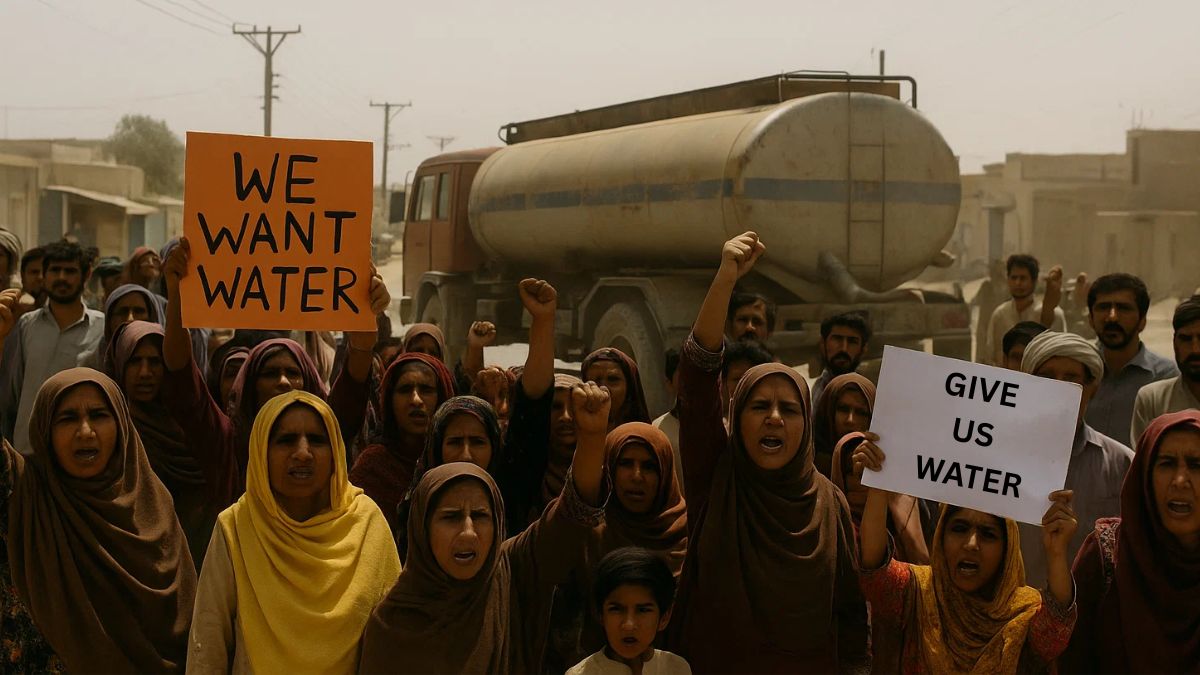Balochistan Declares Water Emergency In Gwadar Amid Protests, As Pakistan Faces Widening Civil Unrest

Thousands of Gwadar residents, including women and children, poured into the streets this week, demanding immediate government intervention over years of water scarcity and neglect. Image courtesy: AI-generated picture via Sora
The Balochistan government has declared a water emergency in Gwadar, suspending all taxes related to water supply, following days of intense public protests over chronic water shortages in the strategic port city.
The move underscores both a worsening humanitarian crisis in Pakistan’s southwestern province and deepening political instability nationwide, as violent clashes erupted simultaneously between police and Tehreek-e-Labbaik Pakistan (TLP) supporters across Punjab.
Why did Gwadar’s water crisis spark emergency measures?
Thousands of Gwadar residents, including women and children, poured into the streets this week, demanding immediate government intervention over years of water scarcity and neglect.
The protests, concentrated outside the Gwadar Development Authority office, quickly gained momentum, forcing the provincial administration to take swift action.
Chief Minister Mir Sarfraz Bugti chaired an emergency meeting to address the escalating crisis, expressing dissatisfaction over the sluggish pace of earlier relief measures.
He announced that all water-related taxes would be suspended with immediate effect, adding that additional funds would be released under the Bridge Financing mechanism to accelerate relief operations.
“If these measures fail to deliver immediate results, I will personally camp in Gwadar with the Chief Secretary to oversee water supply operations,” Bugti warned, signalling the gravity of the crisis.
Why this crackdown on tanker mafia and plans for long-term sustainability?
Bugti also ordered a tough crackdown on the tanker mafia, accusing them of hoarding and exploiting the water shortage for profit. “Those who blackmail people in the name of water will face strict action,” he asserted.
For long-term sustainability, the Chief Minister directed that feasibility studies be conducted to revive 11 non-functional desalination plants in Gwadar. He emphasised that restoring these plants was critical to stabilising water access in the port city, which is central to the China-Pakistan Economic Corridor (CPEC).
Calling access to clean water a “fundamental human need, not an administrative issue,” Bugti urged all political parties and institutions to unite behind a comprehensive water management framework aimed at preventing future crises.
The emergency meeting was attended by Chief Secretary Shakeel Qadir Khan, Additional Chief Secretary (Planning and Development) Zahid Saleem, and senior officials, with Gwadar representatives participating via video link.
Nationwide Unrest: Why TLP clashes deepen Pakistan’s political crisis?
While Balochistan grapples with a humanitarian emergency, Pakistan’s heartland is witnessing violent political unrest.
At least 11 supporters of the Tehreek-e-Labbaik Pakistan (TLP) were killed and more than two dozen were injured in Lahore after violent clashes with Punjab police, according to TLP chief Saad Rizvi.
He accused the authorities of “firing on peaceful protesters” and questioned, “Kis ke kehne par goli chala rahe ho?” (“On whose orders are you firing at us?”).
The confrontations began after police raided Rizvi’s home, detaining his wife, mother, and children, sparking outrage among TLP supporters.
The group has since called for a massive sit-in in Islamabad against what it calls the “Western-backed Gaza Deal,” urging supporters to march toward the US Embassy for a “decisive protest” after Friday prayers.
Authorities have imposed lockdowns in Islamabad and Rawalpindi, suspended internet services in multiple cities, and shut down key highways, including the Lahore–Islamabad–Peshawar motorway, to prevent the convergence of protesters. Senior TLP leader Naeem Chatha and several others were arrested, further inflaming tensions.
What is the geopolitical and domestic fallout?
The simultaneous crises in Balochistan and Punjab reveal Pakistan’s growing internal fragility. Gwadar, seen as a linchpin in China’s Belt and Road Initiative, now faces infrastructural collapse amid public anger over government inefficiency.
Meanwhile, the TLP protests risk drawing Pakistan into another cycle of religiously charged unrest, undermining law and order at a time of severe economic stress.
With water scarcity intensifying in the resource-starved province and violent demonstrations spreading across the country, Pakistan’s leadership faces mounting challenges to maintain stability.
Analysts warn that unless the government swiftly restores public confidence through tangible results, the twin crises could erode the fragile balance between civilian authority, provincial governance, and public trust.







